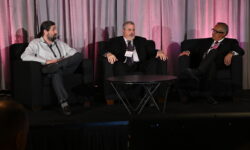State of Residential Security 2020: Dealers Discuss Pain Points, Strategies to Succeed
Executives from four installing security contractors delve into DIY, the dearth of qualified technicians and the uphill battle to inform customers.

(l to r) Shawn Kirk, First Choice Electrical & Security; Stephen Wheeler, Holmes Electric Security; Christian Hess, Guardian Systems; and Chris Dobson, Smithville Security.
Is there a challenge out there that you would like the industry to be working on collaboratively to solve?
Dobson: I’ll start very, very broad … as an industry our biggest challenge is the ability to adapt. We’re a very mature industry. A lot of our companies have been in business for decades. Change is hard. People are buying in different ways. There’s new technology being offered on the market every day, DIY is a disruptive product.
In general, the people that are willing to change, are the ones that are going to be successful over the next five years. The people that resist the change, are going to struggle to remain relevant. Probably the biggest challenge facing the industry is just the ability to change and re-brand and refocus, and discover who we are as professional security.
Wheeler: My 2020 focus: Challenge is an opportunity. Our biggest challenge — and I’m not sure our industry realizes this right now — we only have about 18 months, 24 months left to get all the 3G radios changed. Instead of using it as a negative, we’re trying to use it as a positive. We’re communicating with all of our customers, and we’ve just started this and we’re using this as an opportunity. ‘OK, you can just change your radio and it’s this amount of money, or we have the following options,’ whether it’s Total Connect, sign up for maintenance contract, sign up for other services.
We’re using this to try to educate our customers. We’re not a burglar alarm anymore. We’re a security system, and so my whole team is extremely excited about this. We are going to help our customers move forward. I think that’s the challenge. The industry doesn’t realize that it’s happening. We’re seeing [cellular] towers drop now. A lot of towers are [scheduled to be sunsetted] in 2021.
I have a lot of radios to change. If we change 10 a day between now and then, I don’t know that we’ll get to them all. We’ve got to hustle. We’re just using it as an opportunity to reeducate our customers. I have a line that I try to use, ‘Consumers in 2020 are ready to purchase.’ The question is are we ready to offer them what they want? That’s what we’re trying to do in 2020.
I know two alarm companies in my area. They are small three-employee companies. One of them told me, ‘I’m just going to die with my customers.’ He is not offering anything and he’s losing customers every month, but he’s OK with it because he’s still loving life. He’s still doing the traditional doors, windows, keypad and he talks them out of a radio and remote services. I’m afraid there’s more of those out there than we realize.

Christian Hess, Guardian Systems
Shawn, are you seeing a particular challenge coming up?
Shawn: We’ve still got a long way to go, a big learning curve ahead of us to make sure that we service our customers. Like Stephen said, there are a lot of contractors out there that aren’t interested in it. If I fall into that category I, too, will be sitting on the sidelines looking at the guys who have taken my place.
Many of the builders I work for are always looking for that new, leading-edge. They’re always looking for that answer, and unless I have that answer, I’ll be on the outside looking in. What can I do to be better than [the competition]? What are they doing that I can do better? Growing with Resideo, I think is going to be my learning curve and hopefully we can overcome all that.
Hess: I echo what everybody else is saying. It’s about being able to adjust and go where the market goes. You can’t be complacent. We can’t stay status quo. Things we were doing two years ago are not going to be the same thing as we’re doing two years from now. We have to get our technicians up to par. We have to get our sales guys talking about solutions. We don’t sell gadgets. We sell solutions, just like what Chris was saying. That’s just keeping up with what the market is demanding.
There are three types of people: Guys that watch things happen; guys that make things happen; and there’s guys that wonder what the hell just happened. We don’t want to be those guys who wonder what the hell just happened. We want to be the guys that make things happen in our marketplace.
That’s going to be the big challenge because getting someone to do something different than what they’re accustomed to doing — what they’ve been doing even two or three years — is tough. Personally, it’s tough for me. But it’s one of those things that we’re going to have to just commit to go where the market goes. We’re going to have to provide what the consumer demands and it’s the automation side of it. It’s just more than opening the door and an alarm going off. Those days are gone.
How are you dealing with the 3G sunset? Are you trying to pass the cost of a new radio on to the customer?
Hess: I have one technician in each market I’m in designated to do this, and so we set up appointments. He goes in, he confirms what he’s going to do and then he makes it happen. Then while he’s doing it, he’s nonchalantly offering to the customer a smoke detector, remote services, Total Connect or a maintenance contract in lieu of paying the fee for the radio.
When we did it [2G sunset] five years ago, I did it all for free. I did a similar program where the technician was there and he tried to sell them something, if it was just a replacement battery for the control panel. This time we’re doing it very similar, but we’re charging a fee when we need to replace the radio but we’re giving the customer options in lieu of the fee. Will you sign up for Total Connect? Or you’ve got Total Connect, but you don’t have any automation devices. Do you want to control your lock? Do you want a smoke detector? What all do you want? If you sign up for other ancillary services then we’ll waive the fee for the radio and we will see how it goes.
I can tell you my team is so excited they don’t have to hear that customer get upset with them. They have options for the customer as far as replacing the radio. I have one guy, my objective is to get him replacing 10 radios a day. He’s at about five to six now but he’s not going to sit there and talk to them for half a day. His objective is to change the radios, because I have to get them changed.
Wheeler: During the 2G sunset we had a lot of customers six to 10 years into their contract. We gave them some options but the one that we found was the most popular is we got them to renew their contract for X amount of years and we gave them the $129 radio to get them on for another 60 months. It was a no-brainer. We ate the cost of the conversion. We pre-programmed them all. So basically it was just rip and replace. Got them to sign up. We do all digital contracts anyway so we’re all paperless. They had no latency in their service.
Stephen, are you having to go back and put new radios in again?
Steven Wheeler: Oh yes. We haven’t started just yet. We’re game-planning on how we’re going to approach it this time. That’s going to be another option for some of the older ones now. Some of the ones that we have for the 2G sunset obviously are not in their fifth or sixth year just yet. We’re seeing how many fall in that category. We don’t know how we’re going to. The ones that are still in their renewal time for the 2G are the ones that are going to be a little bit more complicated. We’re going to have to try to treat them with kid gloves at this point. We’re going to have to do something. It’s going to be very minimal cost to the customer, if any. We may just make an executive decision just to eat the cost and keep the customer happy.
Dobson: We’re in the process of upgrading from 3G to LTE. Our strategy is upfront we’re going to do it just to make it through the contract. So if you renew for five years, we’ll eat the cost. The goal is to try to get as many customers as we can upfront, but we will set a deadline. We think there’s going to be a lot of companies that wait until the very last minute. If they don’t upgrade they’ll miss the deadline. We want to be positioned when that happens to go after those companies. We want to get as many customers upgraded upfront as we can.
If we can offer it and eat the costs if you sign the contract, we’ll come out and we’ll be happy to do it. The customers that don’t want to sign a contract or don’t want a long-term contract, I think we’re going to do a hybrid where we’ll give them options. If you want us to come out and just do the radio swap, no paperwork, no agreement, it’s going to be this. If you have them on Total Connect, we’ll give them some options and give them some discounts. It’s a little bit of a hybrid.
Wheeler: The alarm industry should already have a 5G radio. 5G is shorter range and the antennas are not out there, but most major cities have 5G networks working. We need the option to go ahead and put the 5G radio in now, because we’re going to be doing this again in five years. There are communities in which 5G isn’t available so your only option is LTE. But if the alarm industry had a 5G radio now — and we could choose it over LTE — our lives would be easier five years from now.
Hess: That’s a good idea. I’d be willing to pay even a little more for it.
Wheeler: The industry is always trying to catch up. We need to jump out in front. That’s a typical example of how we wait for the masses to happen, but we know it’s coming. Let’s go on and do it if that helps.
If you enjoyed this article and want to receive more valuable industry content like this, click here to sign up for our FREE digital newsletters!

Security Is Our Business, Too
For professionals who recommend, buy and install all types of electronic security equipment, a free subscription to Commercial Integrator + Security Sales & Integration is like having a consultant on call. You’ll find an ideal balance of technology and business coverage, with installation tips and techniques for products and updates on how to add to your bottom line.
A FREE subscription to the top resource for security and integration industry will prove to be invaluable.








